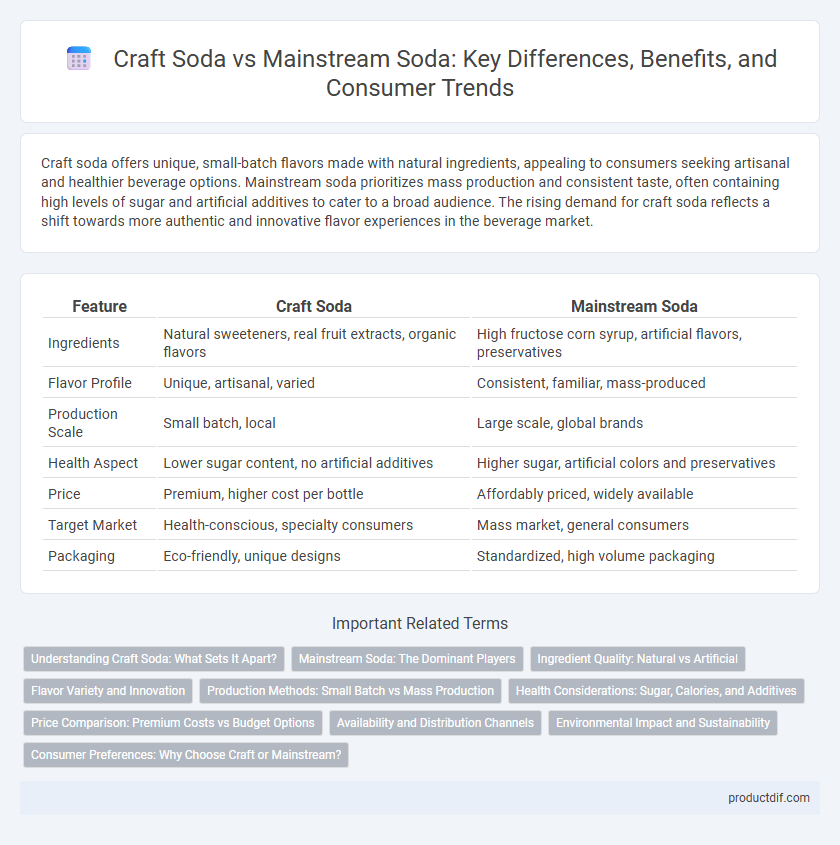Craft soda offers unique, small-batch flavors made with natural ingredients, appealing to consumers seeking artisanal and healthier beverage options. Mainstream soda prioritizes mass production and consistent taste, often containing high levels of sugar and artificial additives to cater to a broad audience. The rising demand for craft soda reflects a shift towards more authentic and innovative flavor experiences in the beverage market.
Table of Comparison
| Feature | Craft Soda | Mainstream Soda |
|---|---|---|
| Ingredients | Natural sweeteners, real fruit extracts, organic flavors | High fructose corn syrup, artificial flavors, preservatives |
| Flavor Profile | Unique, artisanal, varied | Consistent, familiar, mass-produced |
| Production Scale | Small batch, local | Large scale, global brands |
| Health Aspect | Lower sugar content, no artificial additives | Higher sugar, artificial colors and preservatives |
| Price | Premium, higher cost per bottle | Affordably priced, widely available |
| Target Market | Health-conscious, specialty consumers | Mass market, general consumers |
| Packaging | Eco-friendly, unique designs | Standardized, high volume packaging |
Understanding Craft Soda: What Sets It Apart?
Craft soda distinguishes itself from mainstream soda through its emphasis on natural ingredients, artisanal production methods, and unique flavor profiles often sourced from local or organic ingredients. Unlike mass-produced sodas, craft sodas typically avoid high-fructose corn syrup and artificial additives, appealing to health-conscious consumers seeking authentic taste experiences. This focus on quality and innovation enables craft soda brands to command premium pricing and foster dedicated niche markets within the broader beverage industry.
Mainstream Soda: The Dominant Players
Mainstream soda brands like Coca-Cola, Pepsi, and Dr Pepper dominate the global beverage market with extensive distribution networks and massive marketing budgets, securing a significant market share. These industry giants produce a wide range of popular flavored sodas, leveraging economies of scale to offer competitive pricing and consistent product availability. Their dominance is reinforced by strong brand recognition and long-standing consumer loyalty, positioning them as the primary choice in carbonated soft drinks worldwide.
Ingredient Quality: Natural vs Artificial
Craft soda distinguishes itself from mainstream soda through the use of high-quality, natural ingredients such as real fruit juices, organic sweeteners, and natural flavor extracts. Mainstream sodas often rely on artificial flavors, high-fructose corn syrup, and synthetic additives to reduce production costs and increase shelf life. This emphasis on natural, less processed components in craft soda results in a richer taste profile and appeals to health-conscious consumers seeking cleaner beverage options.
Flavor Variety and Innovation
Craft soda offers a diverse array of unique flavors, often utilizing natural ingredients and small-batch production techniques that emphasize innovation and artisanal quality. Mainstream soda typically features a limited selection of classic flavors like cola, lemon-lime, and root beer, relying on mass production and consistent taste profiles. This contrast highlights craft soda's focus on experimentation and distinct taste experiences compared to the standardized offerings of mainstream brands.
Production Methods: Small Batch vs Mass Production
Craft soda relies on small-batch production methods, emphasizing artisanal techniques, natural ingredients, and precise flavor crafting to ensure unique taste profiles. Mainstream soda is produced through mass production processes, utilizing automated assembly lines, standardized recipes, and large-scale bottling to maximize efficiency and consistency. The small-batch approach allows for greater innovation and quality control, contrasting with the high-volume output that prioritizes cost-effectiveness and uniformity in mainstream soda manufacturing.
Health Considerations: Sugar, Calories, and Additives
Craft sodas typically contain lower sugar levels and fewer artificial additives compared to mainstream sodas, making them a healthier option for consumers seeking natural ingredients. Mainstream sodas often have high calorie content and include synthetic preservatives, colorings, and flavorings that may contribute to health issues such as obesity and diabetes. Choosing craft sodas can reduce exposure to harmful additives while offering unique flavors with a more transparent ingredient list.
Price Comparison: Premium Costs vs Budget Options
Craft soda typically commands higher prices due to artisanal ingredients, small-batch production, and unique flavor profiles, often ranging from $2 to $4 per 12-ounce bottle. Mainstream sodas, produced at scale by major brands like Coca-Cola and Pepsi, generally cost between $0.50 to $1.50 for the same size, benefiting from economies of scale and widespread distribution. Consumers weighing craft soda's premium quality against mainstream options often consider price as a primary factor in beverage selection.
Availability and Distribution Channels
Craft soda is typically available in specialty stores, farmers' markets, and select cafes, leveraging local distribution channels to target niche audiences seeking unique flavors. Mainstream soda dominates widespread retail outlets, supermarkets, convenience stores, and vending machines, using extensive global supply chains to ensure mass availability. The limited production scale of craft sodas contrasts with the high-volume, automated distribution networks of mainstream soda brands, affecting their market presence and accessibility.
Environmental Impact and Sustainability
Craft soda brands often prioritize environmental sustainability by using organic ingredients, biodegradable packaging, and supporting local suppliers, which reduces carbon footprints compared to mainstream soda production. Mainstream sodas typically rely on mass-produced sweeteners like high-fructose corn syrup and plastic packaging, contributing significantly to pollution and resource depletion. Choosing craft sodas can lower environmental impact through smaller-scale, eco-friendly practices and greater transparency in sustainability efforts.
Consumer Preferences: Why Choose Craft or Mainstream?
Craft soda appeals to consumers seeking unique flavors, natural ingredients, and artisanal quality, offering a distinct alternative to mainstream sodas often characterized by high sugar content and artificial additives. Mainstream soda remains popular due to widespread availability, consistent taste, and strong brand loyalty, catering to consumers prioritizing familiarity and affordability. Increasingly, health-conscious consumers favor craft sodas for their perceived purity and innovative ingredients, influencing market trends and driving growth in the craft beverage sector.
Craft Soda vs Mainstream Soda Infographic

 productdif.com
productdif.com